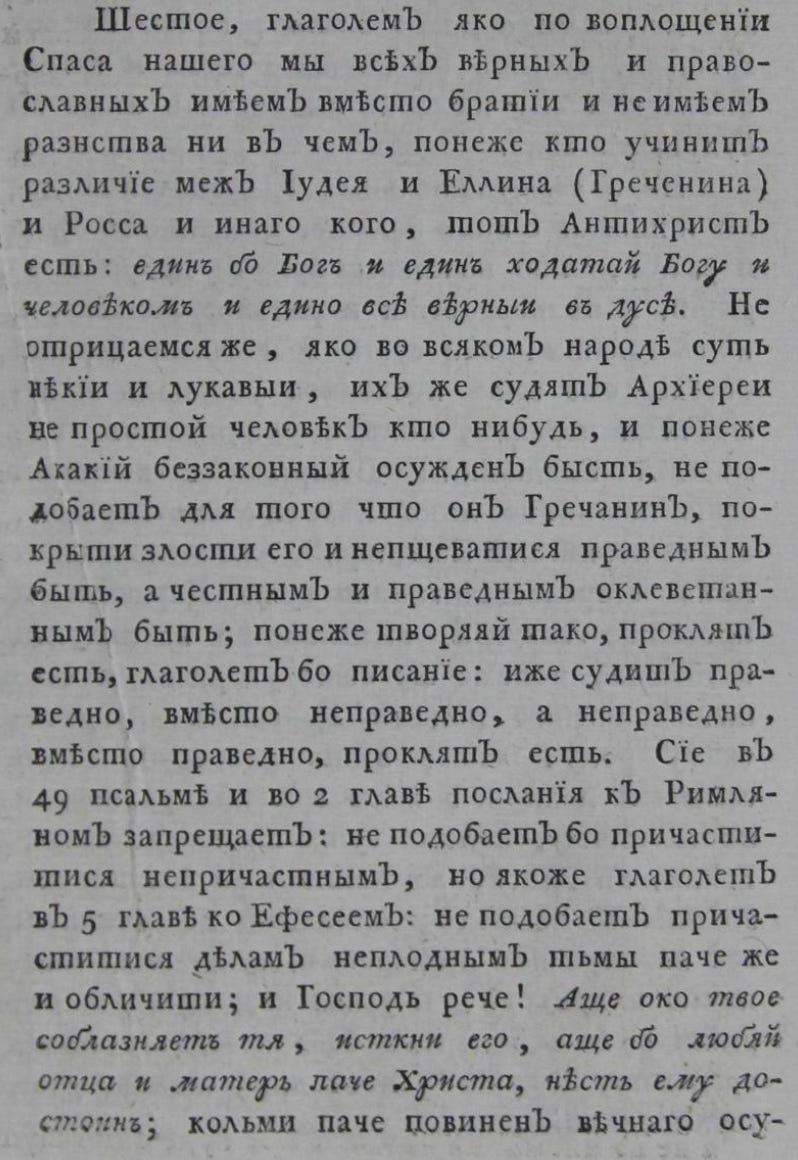Patriarch Dositheus of Jerusalem's anathematization of phyletism
Almost 180 years before the Council of Constantinople in 1872 Patriarch Dositheus II Notaras of Jerusalem had anathematized ethnophyletism in an epistle to Russian Tsar Peter the Great.
In an epistle dated August 9th, 1693 AD, to Tsar Peter the First of Russia Patriarch Dositheus II Notaras of Jerusalem had anathematized the concept of the heresy of phyletism or ethnophyletism nearly 180 years before such a term was coined in the 19th century at the local Orthodox Council of Constantinople in 1872 AD. The council defined phyletism as the “distinction based on the difference of ethnic and linguistic origin and the claim or exercise of exclusive rights on the part of individuals and groups in the same country and of same blood, may have some basis within secular nations, but it is foreign to our order… [We condemn] the distinctions between races and the quarrels, rivalries, and divisions for a national reason in the Church of Jesus Christ, as opposed to the teaching of the Gospel and to the holy canons of our blessed fathers.”1
Patriarch Dositheus writes:
Sixth, we declare that after the incarnation of our Savior, we call all the faithful and Orthodox as brothers and do not make any distinction between them. For whoever makes a distinction between a Jew and a Hellen (Greek) and a Russian and anyone else, is an Antichrist: ’for there is one God and one mediator between God and man, and all the faithful are one without distinction.’ We do not deny that in every nation there are wicked and deceitful people, judged by the Bishops and not by an ordinary person. Since Akakios the Lawless was condemned, it is not fitting to cover his evil because he is a Greek, and not to pretend to be righteous while being slandered as honest and just; for whoever does so is accursed, for the scripture says: ’he who judges righteously instead of unrighteously, and unrighteously instead of righteously, is accursed.’ This is forbidden in Psalm 49 and in chapter 2 of the Epistle to the Romans: it is not fitting to partake with the unworthy, but as it says in chapter 5 of the Epistle to the Ephesians: ’it is not fitting to partake in the unfruitful works of darkness but rather expose them’; and the Lord said: ’If your eye causes you to sin, pluck it out; if one loves father or mother more than Christ, he is not worthy of Him’; how much more is he worthy of eternal condemnation, who, for the sake of pleasing men, ’calls evil good and good evil’; thus says the Prophet: ’woe to those who call evil good and good evil’; for willingly sinning, he blasphemes against the Holy Spirit and will not be forgiven in this age nor in the age to come.2
-Dositheus II Notaras, Patriarch. Epistle to the Sovereign of All Russia. Tumansky F. O. Collection of Various Notes and Writings, Serving to Provide Complete Information on the Life and Deeds of His Majesty Emperor Peter the Great. St. Petersburg, 1788. Part 10. Page 119.
//
Досифей II Нотара, патр. Послание к государям Всероссийским. Туманский Ф. О. Собрание разных записок и сочинений, служащих к доставлению полнаго сведения о жизни и деянищих к доставлению полнаго сведения о жизни и деяниях государя императора Петра Великого. СПб., 1788. Ч. 10. С. 119.3
One can read more of the decree of Constantinople 1872 against phyletism and a summary of the council here: https://x.com/TaborPravda/status/1705388424356941997/photo/1. Or directly from the text: M. Stavrou, The Great Councils of the Orthodox Churches Decisions and Synodika From Constantinople 861 to Constantinople 1872, pp. 365-366.
One can read the rest of this book online in Russian here: https://elib.rgo.ru/safe-view/123456789/217520/1/WmFwUGV0clZlbF8xMC5wZGY=







Was this related to anything Tsar Peter did?